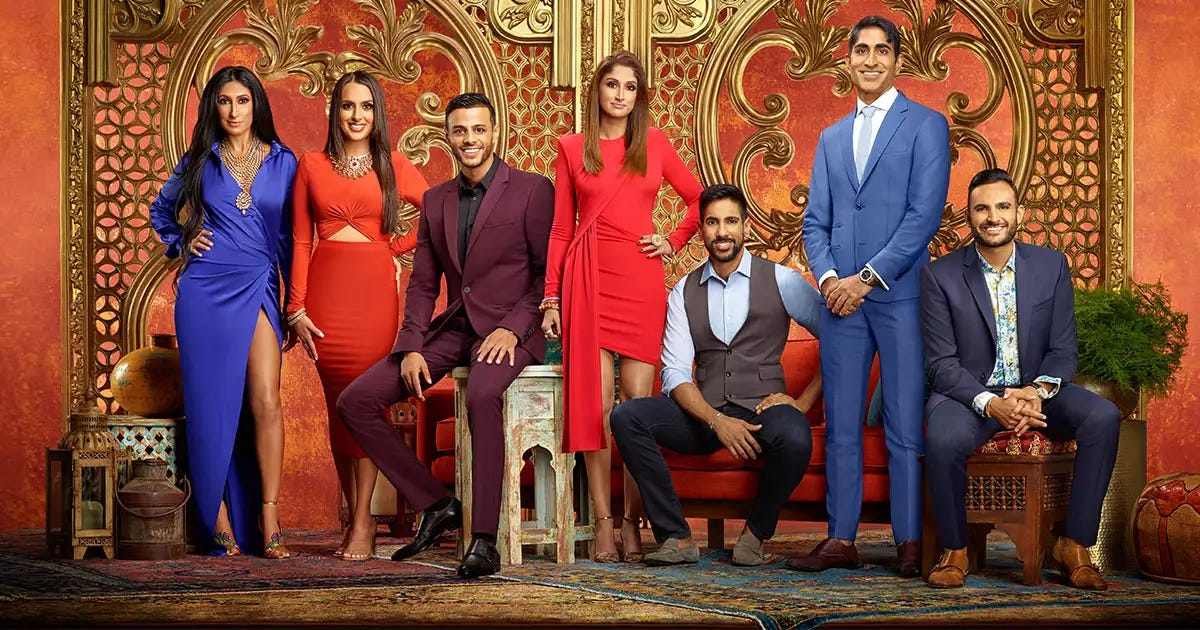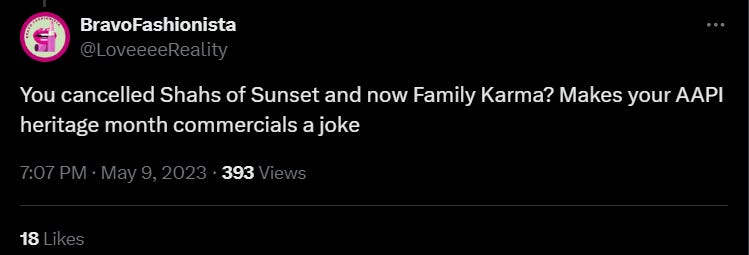Bravo's Treatment of Crystal Kung Minkoff Was a Mistake They Need to Stop Making
A closer look at Bravo's head-scratching decisions regarding AAPI stars and TV series.
I am a longtime Real Housewives fan. How big a fan? My second novel was inspired by Real Housewives of Beverly Hills. But this past summer, I took a Bravo break and barely tuned into the network at all. Yet with new seasons of must-see series such as Real Housewives of New York City and Real Housewives of Salt Lake City premiering soon, I find myself drawn toward Bravoland again, even though I now have mixed feelings about the franchise.
My fandom began to waver this past spring. May is Asian American and Pacific Islander Heritage Month, and for the second year in a row, Bravo marked the occasion by axing a fan favorite — who is Asian American.
Bravo fans were shocked when Crystal Kung Minkoff announced that she was not asked back to the Real Housewives of Beverly Hills for a fourth season. From her “ugly leather pants” feud with Sutton Stracke evolving into a genuine friendship, to squaring off with fellow Housewives Annemarie Wiley and Dorit Kemsley, Minkoff was smart, funny and highly watchable throughout her time on the show.
For AAPI viewers, Minkoff, 41, was of special interest as one of only a handful of Asian American Housewives to ever appear on the franchise, and the first ever on RHOBH. After joining in 2021, Minkoff, who is Chinese American, spent much of her initial season addressing accusations from the cast for either being too quiet, and when she did speak up, for being too difficult.
Whenever Minkoff tried to share her perspective as a then-thirtysomething woman of color in a cast made up of mostly of fifty-something white women, it stoked a lot of the drama between her and other Housewives, especially Stracke.
Yet by the end of her third season, which concluded in April, Minkoff fiercely called out the microaggressions and stereotyping she experienced from her cast members, such as when Kemsley called her a “child bride.” Minkoff and Stracke also overcame their differences to become not just merely on-camera allies, but close friends off the show as well.
During her time on RHOBH, Minkoff became adept at a tricky balance of representing herself authentically, showcasing her pride in her culture, while also in the parlance of Bravo viewers, “bringing it” in terms of entangling herself in the drama.
This evolution was appreciated by viewers, especially those who saw their experiences reflected in Minkoff’s. In fact, prior to joining RHOBH, she worried about the high expectations of having to represent an entire community.
But Minkoff came to embrace the significance of her position on the show, boosting her self-confidence in the process. “Now I'm turned into someone who's loud and proud,” she said in a November 2023 interview. “I actually now wear [Asian representation] with the badge of honor.”
Yet Minkoff was let go right when she seemed fully comfortable as a Housewife.
Cut to May 2024, the first day of AAPI Heritage Month, and two weeks after she was fired. Peacock, the streaming service owned by NBC/Universal that airs all Bravo series, featured Minkoff front and center in its “API Voices Collection” of recommended programming. And it did not escape the star’s attention. She shared it on Instagram, seemingly shading the hypocrisy of her former TV home.
What makes this even more confounding was that Bravo pulled this same move last year. But instead of firing a fan favorite Housewife, they pulled the plug on a fan favorite series.
For AAPI Heritage Month in 2023, Bravo aired a commercial touting the traditions of Asian and Pacific Island cultures as represented on the network, and nearly all of them were from Family Karma, a reality show about a tight-knit group of Indian American friends living in Florida. The series, which had a predominantly Indian cast, was beloved by viewers because it offered a glimpse of desi culture while also featuring family dynamics that were entertaining and universally relatable.
Yet the network dropped (or “paused”1) Family Karma the same month they aired the ad touting it as an example of the network's diverse programming. (That ad had long since disappeared, but this tweet captured the fan outcry at the time.)
The optics were not great for a number of reasons. Family Karma was the first Bravo series to have an all-Asian cast. And for the three seasons it aired, Bravo was happy to soak up accolades for the series, such as when GLAAD nominated it for Best Reality Program for what Andy Cohen called “one of the most powerful hours of television ever on Bravo.”
On top of all this, Family Karma won the GLAAD Award for 2024 Outstanding Reality Program—even though it was canceled last year.
 Tiktok failed to load.
Tiktok failed to load.Enable 3rd party cookies or use another browser
It demonstrates the way TV networks and streamers often have no idea what makes series like Family Karma worthwhile beyond being able to say they have “diverse” shows during heritage months.
Sure, Jessel Taank currently stars on the rebooted Real Housewives of New York and became an instant fan favorite in her first season. Katie Ginella is a new full-time member on Real Housewives of Orange County, and Meili Workman is a “friend of”2 on the latest season of Real Housewives of Salt Lake City. It’s also worth pointing out that in terms of non-Housewives programming, longtime Top Chef host Padma Lakshmi was replaced by past winner Kristen Kish, and the show has had several AAPI contestants in its twenty-plus seasons, including six winners.
But at the moment, Taank and Ginella, who are of Indian and Korean descent respectively, are currently the only two Asian Housewives in the entire franchise (part-time cast member Workman is Taiwanese American). Besides Minkoff, Bravo also lost two other breakout stars with AAPI heritage in recent years: Dr. Tiffany Moon after Real Housewives of Dallas was canceled in 2021, and Jen Shah from Real Housewives of Salt Lake City, currently serving a stint in prison. 3
And just like Minkoff, Taank and Moon were the only Asian Housewives on their respective series. As a result, each experienced issues with communicating with their fellow Housewives because they were the only AAPI women in their respective casts. This led to conflicts and clashes that fueled the drama, but also left the women feeling isolated and misunderstood in the aftermath. As the only non-white cast member on RHOC, it would be surprising if Ginella did not have a similar experience at some point.
(The only time two AAPI women were on the same Housewives cast was when Jennie Nguyen was on Season 2 of RHOSLC with Shah. Nguyen was fired in 2022 for making racist comments on Facebook).
Bravo has also done a much better job with diversity with other series, notably the long-running Real Housewives of Atlanta, Real Housewives of Potomac as well as Married to Medicine, which all have primarily Black casts4; Shahs of Sunset which had an Iranian American cast, and was also canceled in 2021 after a nine-season run (as noted in the above tweet); and the Real Housewives of Miami, a show that boasts a multilingual cast that vibrantly reflects the city's Latino, Hispanic and Caribbean population. 5
All of this only underlines Bravo’s shoddy treatment of AAPI stars and viewers. Which is a real shame: Together, Crystal, Katie and Jessel could have been a part of an exciting new vanguard of 21st century Real Housewives who are fabulously wealthy, chic and funny, while also being able to speak about issues of interest to the AAPI audience.
And their presence could have meant ushering in even more AAPI Housewives to join established casts or creating more shows that center people with AAPI backgrounds.
I should add that this all feels personal to me for two reasons.
As a longtime Bravo viewer, my second novel Advika and the Hollywood Wives was inspired by watching the sixth season of RHOBH6. And one of my book’s titular wives, a Vietnamese American reality TV star on a Housewives-esque show named Victoria Truong, was directly inspired by Minkoff.
As someone who wrote the character Victoria as a reaction to watching Minkoff be snubbed and misunderstood by the other RHOBH women, it smarts that Minkoff was not invited back just as she had finally found her footing as a Housewife. (Whereas other Housewives are allowed to coast for multiple seasons while bringing nothing nearly as interesting to the screen.)
Taank is a well-deserved fan favorite right now, but if she happens to flail in future seasons, I wonder how long she’ll continue to receive network support.
And to take you behind the curtain, for the past two years7 I’ve been trying to pitch this very article during AAPI Month to several mainstream media outlets, hoping to spotlight Bravo’s questionable treatment of its AAPI talent and audience. And the response has been...crickets.
Of course, this is a problem that goes beyond Bravo. Various corporations and industries like to use diversity months like Black History Month, AAPI Heritage Month and Pride Month as a way to tout their DEI bonafides. Once those months end, the promotional efforts subside too.
But for Bravo to axe AAPI stars and series close to or during the month that is supposed to celebrate them feels pointed.8 It shows how little the network cares about the optics because they received so little pushback on it beyond vocal segments of their viewership.
Minkoff had a thriving career as an entrepreneur prior to Bravo and has continued to find opportunities for herself outside of RHOBH. But for viewers who had tuned in to watch her, we have learned that much like Minkoff and the cast of Family Karma, we are expendable.
So at what point should Bravo become expendable to us?
In Bravo parlance, a “pause” is an indefinite hiatus with no guarantee of returning.
“Friend of” is Bravo parlance for a reality star who is not a full-time cast member, but instead appears on the show as a friend of one of the main Housewives.
Moon is Chinese, and Shah is of Tongan and Hawaiian descent.
That said, Bravo recently “paused” Real Housewives: Martha’s Vineyard, which had an all-Black cast.
Though less so with the Real Housewives of Dubai, which is mostly made up of expats save for one woman of Emirati heritage and one of Armenian descent.
I was inspired to write Advika’s May-December romance between a young woman and a Hollywood producer, and how the woman feels inadequate when comparing herself to her new husband’s famous ex-wives, while watching Yolanda Hadid’s disintegrating marriage to famed music producer David Foster. All the while thinking about how after Foster divorced Hadid, he married Katherine McPhee, who is 35 years younger than him.
In 2023, I tried pitching an article about Family Karma getting dropped during AAPI Heritage Month.
An argument can be made that networks always announce their programming slates in the months of April and May, and it is just an unfortunate coincidence for Bravo that their announcements overlap with AAPI Heritage Month. But isn’t that all the more reason that more care and consideration should be given to the timing when announcing their decisions as well?










Such a good and important read!
Great work, Kirthana!